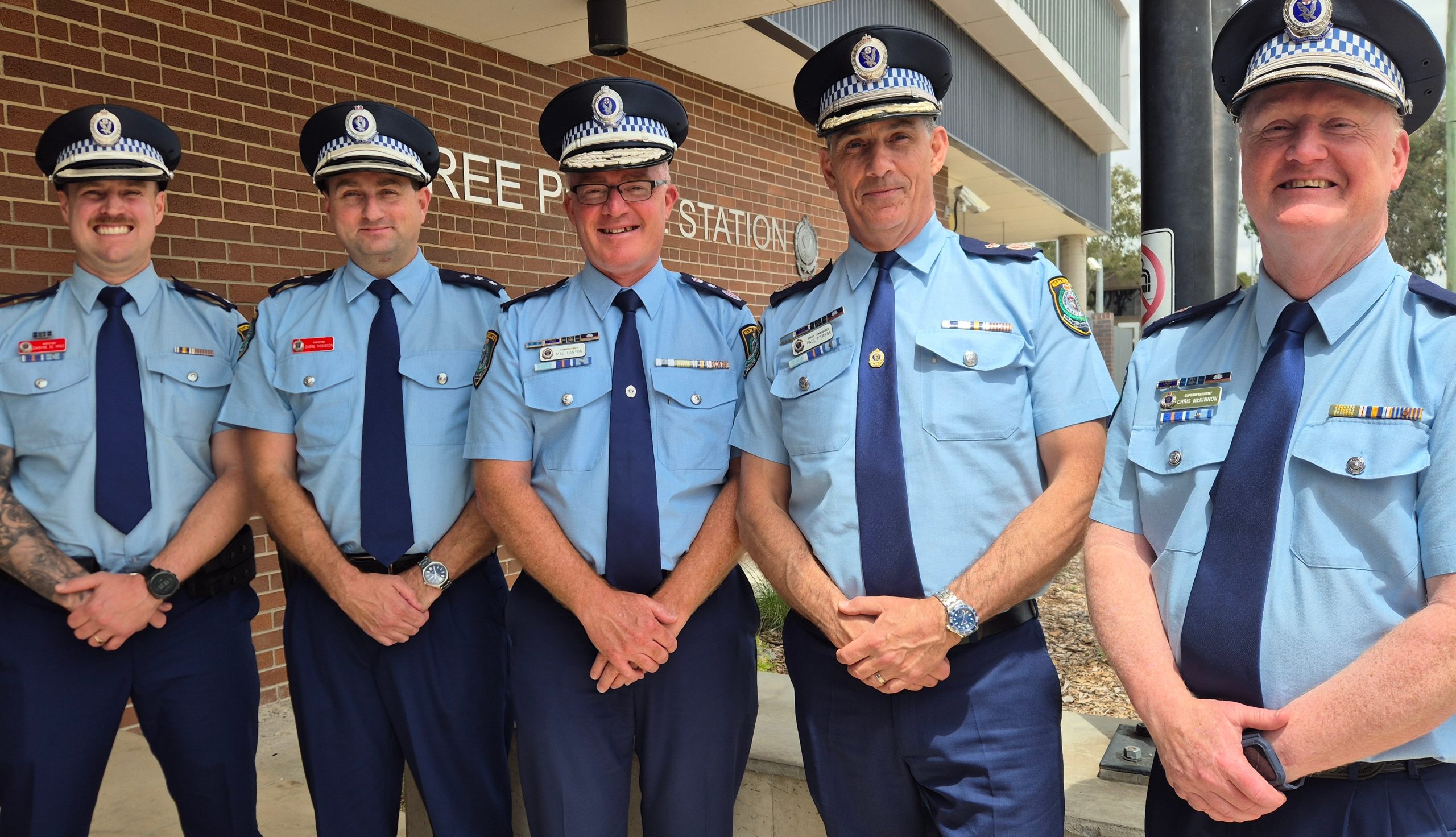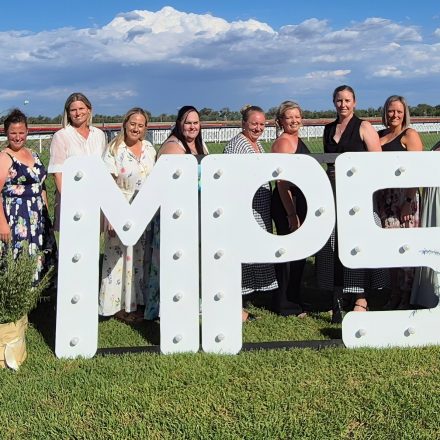NEWLY-appointed Commissioner of the NSW Police Force, Mal Lanyon, was in Moree on Thursday to meet with local police as part of a roving tour across rural and regional New South Wales.
The week-long tour, which included visits to Kempsey, Port Macquarie, Dubbo and Tweed Heads today, has focused on talks with officers on the ground, dealing with serious and violent youth crime.
“The meetings have been really positive. The main reason I wanted to get around so quickly is because I’ve made regional crime and youth crime a priority for me as the commissioner,” Mr Lanyon said.
“Importantly, we’ve spoken to mayors, councillors, community members and the police, just to get a sense of what’s happening and what support is needed.”
Mr Lanyon, who last month replaced Karen Webb in the top job, was joined in Moree by Deputy Commissioner Paul Pisanos, who oversees regional operations.
Mr Lanyon and Mr Pisanos were met by New England Police District Superintendent Chris McKinnon and New England Police District Inspectors Dwayne De Vries and Shane Robinson, both stationed in Moree.
Mr Lanyon said the serious nature and violence associated with youth crime in rural hotspots like Moree is a chief priority.
Children as young as 11 are being charged with serious offences involving aggravated violence and dangerous weapons. He said the scale of crime is disturbing.

(from left) New England Police District Inspectors Dwayne De Vries and Shane Robinson, newly-appointed Commissioner of the NSW Police Force, Mal Lanyon, Deputy Commissioner Paul Pisanos and New England Police District Superintendent Chris McKinnon in Moree on Thursday.
“The type of crime we once associated with youth is now vastly different,” Mr Lanyon said.
“We’re talking about aggravated break-and-enters, and people going into people’s homes when they’re there. Youth are being charged with carrying serious weapons – dangerous weapons.
“Some of these offences are simply disgraceful. The type of violence being used against people in their own homes is horrific. A number of elderly residents have been targeted and that type of behaviour is simply unacceptable,” he said.
“Even if it’s a single incident of a home invasion, the fear that is instilled in those involved is shocking.”
Mr Lanyon said hotspots in New South Wales have known, repeat offenders.
“The majority of these crimes, or 90 per cent of the people committing these crimes are repeat offenders, and there are also cohorts,” he said.
“Not every kid living in these areas are engaging in these crimes. There is a particular cohort, whose behaviour we look at and whose behaviour we take action against.”
Bail laws
Community frustration across New South Wales centres on the perceived ‘revolving door’ in the criminal justice system.
Repeat offenders are being bailed, with many re-offending while on bail.
Police gained a win earlier this year with an extension of Section 22C of the Bail Act.
Section 22C is a temporary law that creates an additional bail test for young people aged 14 to 17 accused of specific offences, while already on bail for a similar offence. These include serious break-and-enter offences and motor vehicle theft.
For bail to be granted under Section 22C, a judicial officer must have a ‘high degree of confidence’ the young person will not commit another serious indictable offence while on bail.
If this confidence is not met, bail must be refused. The provision has been extended until April 4, 2028.
“Bail, and the actual bail act, is a matter for government to decide,” Mr Lanyon said.
“There has been some significant changes. Obviously, Section 22C is something we use a fair bit for the types of crimes we’re seeing in rural areas, like aggravated break-and-enters and stolen motor vehicles.
“We need to take really strong action when it’s required. We need to continue working with government, though a lot of what we’re talking about is trying to make sure the whole system is supporting the work we do, so we can reduce those serious crimes,” he said.
Commissioner Lanyon said the changes to the bail act are significant.
“Judicial officers need to have a high level of confidence that children who are granted bail under 22C aren’t going to commit another indictable offence while they’re on bail,” he said.
“Prosecutors work very hard to demonstrate the likelihood so the person deciding bail can look at it and say it’s too great a risk to the community.
“We’ll continue to do that. Our police prosecutors do a fantastic job putting the evidence before the court.
“The judicial officers have a level of independence from the police, which is appropriate, and they decide bail according to the bail act,” he said.
Castle Law
Lobbies and ePetitions in recent months have pushed for Castle Law, which gives victims the right to use whatever force necessary to protect themselves, others and their property if faced with an intruder or intruders.
Petitions, some with tens of thousands of signatures, are calling on Parliament to amend the Crimes Act 1900 (Crimes Act) so that a person who uses force in self-defence in their home cannot be regarded as acting unlawfully, provided the use of force is not grossly disproportionate.
However, Attorney-General Michael Daley this week said in a written response to an ePetition lodged by Member for Northern Tablelands, Brendan Moylan, “the NSW Government is not proposing to change the law on self-defence at this time”.
Commissioner Lanyon said he is certainly aware there is a push for Castle Law.
“At the moment, for those people protecting certainly themselves within their home, there is a self-defence law that is available to them that requires the actions to be reasonable and proportionate,” Mr Lanyon said.
“As a police commissioner, and as a police officer, I don’t advocate people challenging people who break into their homes, for the obvious reasons.
“We don’t want an escalation in violence, and we’ve seen many examples where that has happened, and we don’t want there to be any tragedy.
“We prefer people to make contact with the police and get us there as quickly as possible. We will respond quickly to those matters. The decision as to whether Castle Law is appropriate is more for the Attorney-General and government to think about,” he said.
Adult Crime, Adult Time
In Queensland, new laws introduced as part of the Making Queensland Safer campaign have provisions for Adult Crime, Adult Time.
There is a push to introduce similar laws in New South Wales.
“Again, it’s a matter for government, and we’ll work with government,” Mr Lanyon said.
“It’s not a one size fits all, either. With Adult Crime, Adult Time, there would be a range of circumstances to take into account.
“Things like Adult Crime, Adult Time is a matter for government to decide whether that is the way to go, but we have significant penalties for criminal offences at the moment, and that’s the action that we take,” he said.
Intervention strategies
Commissioner Lanyon firmly beliefs programs aimed at steering young offenders back on track and away from crime are key to turning young lives around – but all departments need to be co-ordinated and working together to make it happen.
“I think any program that can act as a circuit-breaker or to divert people from going into the criminal justice system, or away from hurting people, is a good thing,” Mr Lanyon said.
“One of my key focuses as commissioner is to start making sure we have co-ordination of services in areas like Moree, and to make sure it’s lined up so we’re actually using the resources.
“Whether it’s the police, department of community justice, or whether it’s community service providers, we need to be all lined up to get the best outcomes,” he said.
“This is a community that has a lot of support, and making sure that’s in a co-ordinated fashion is important.
“That’s why we’ve certainly got to work with other agencies, other parts of government and other parts of the community to try and change the behaviour of these kids,” he said.
“The ability to be able to divert young people away from a life of crime and program opportunities to put them on a different path, rather than go through the criminal justice system, is important.
“There is a real need to co-ordinate efforts to make sure the community is supported.”
“In regional areas, it’s about providing opportunities for kids going forward. In towns like Moree, there is significant investment to provide jobs in the future through skills training.”
Commissioner Lanyon fully supports Premier Chris Minns’ resolute and genuine efforts to address youth crime – and crime in general – across New South Wales.
“The Premier is committed to addressing youth crime and the crime we are seeing in regional areas at the moment,” Mr Lanyon said.
“He’s made a number of announcements and he’s well aware I’m out here with my commitment to regional crime.
“It’s about joining up the services and the investment that’s being put into these communities to make sure we’re all working for one outcome, and that is very much where the Premier wants us to be.
“The Premier is absolutely laser-focused on reducing crime in regional areas,” he said.
Doli incapax
There are moves at present to scrap doli incapax, a legal principle that presumes children aged under 14 may not sufficiently understand the difference between right and wrong to be held criminally responsible. It operates as a common law presumption in New South Wales but can be rebutted if the prosecution proves beyond reasonable doubt a child understood their actions were seriously wrong.
Former Justice of the Supreme Court of New South Wales, Geoffrey Bellew, and former Deputy Commissioner of the New South Wales Police Force, Jeffrey Loy, are currently conducting a review into the operation of doli incapax.
The review findings are expected to be reported to Attorney-General Michael Daley later this year.
“Doli incapax is very much a view for government. We work through it; it is a presumption that exists within the law at the moment,” Mr Lanyon said.
“Probably what concerns me most is that at the time it was introduced, the type of crimes were probably at a different level.
“I think what we’re now seeing are significantly violent crimes, and that’s why, where needed, we take appropriate and positive action to put the kids before the courts,” he said.
Operation Soteria
Earlier this year, NSW Police launched Operation Soteria, a strategic initiative concentrated on aggravated break, enter and steal offences, motor vehicle theft, with a focus on enforcing bail conditions and conducting compliance checks.
More than 150 police and detectives are now assigned to Operation Soteria, which was initially expected to run for three months but has been extended indefinitely.
“As police, we’ve got a really clear role, and operations like Soteria where we actually surge into areas to support the local police and make a statement, sends a really strong message to the community,” Mr Lanyon said.
“We’re getting fantastic results. Since March, there’s been about 250 people arrested – 170 juveniles – and 39 per cent of those were on bail at the time they committed offences.
“The serious nature of some of those offences, the violence that’s being used, the weapons being used, is such that we need to take positive action to make sure the community feels safe,” he said.
“I think what’s been demonstrated by Operation Soteria is that we’ll support the community by taking appropriate action, whether it’s youth or adult offenders.
“We won’t tolerate the types of crime we’re seeing at the moment, because we can see what it does to the community.
“The last thing I want is families living in fear, and I don’t want children growing up thinking that’s a normal part of their life.
“It is unacceptable the types of crime we are seeing at the moment,” he said.
Parental responsibility
Commissioner Lanyon fully understands home life and upbringing are key factors that can lead youth off track. Drugs and alcohol are concerning elements.
“There’s little doubt parental responsibility is not strong when any type of adverse behaviour happens,” he said.
“In regional areas, the use of drugs, amphetamines and speed, and those types of things, are having an impact on communities.
“If there are parents using drugs, their ability to supervise kids is obviously reduced.
“If there are kids using drugs, the need to commit crimes to pay for those drugs is there. Drugs have a serious impact on regional communities.
“As police, we do a lot of operations to actually target the supply of drugs in regional communities for exactly that reason, because we know the impact it has.
“Everyone has an upbringing, and everyone has a background, and it’s about how we take that forward to change the path for these kids,” he said.
Above and beyond
Commissioner Lanyon said he is grateful to be given opportunities to visit rural and regional police stations and communities.
“One of the great things about this role is that I can get across New South Wales, and it’s important I do,” he said.
“My officers give everything, every day. They commit themselves fully, and it’s appropriate they see leadership and support right across the state.
“One of the most striking things coming up this week is my pride in all officers – the morale, their commitment to community, and what they do every day working as a team.
“When we surge officers from Operation Soteria, it give local officers great support, and I’m seeing great leadership as well.
“We’ve got some wonderful leader here at Moree, who are leading some young officers who are doing really good things.
“I’m incredibly proud of the work the police do every day,” Mr Lanyon said.
New England Police District Inspector Dwayne De Vries welcomed Commissioner Lanyon and Deputy Commissioner Paul Pisanos to Moree Police Station on Thursday.
“Their visit was an opportunity to connect executive leadership with frontline officers, and reaffirm the NSW Police Force’s commitment to community-focused policing,” Insp De Vries said.
“Meetings with Moree mayor Susannah Pearse, deputy mayor Wayne Tighe, community representatives and a recent victim of crime highlighted the shared priorities of trust, accountability and collaboration in policing our region.
“Officers at the station expressed clear pride and appreciation in welcoming the Commissioner,” he said.
“Their response reflected the value of direct engagement from senior leadership and its positive influence on morale and motivation within regional commands.
“Commissioner Lanyon’s decision to visit Moree within weeks of his appointment is testament to his focus on regional and youth crime.
“His proactive approach demonstrates a leadership style grounded in visibility, responsiveness, and a practical commitment to addressing the distinct challenges faced in regional communities such as Moree,” Insp De Vries said.
In Moree, youth crime levels have fallen compared with 2023, Insp De Vries said.
“This reflects the impact of targeted policing, community partnership initiatives, and Operation Soteria,” he said.
“However, ten young people currently remain in custody. There is an ongoing need for early intervention, diversion, and support services to reduce reoffending and strengthen community safety.”
Words and Image: Bill Poulos



















































































Well done, keep up the good work!